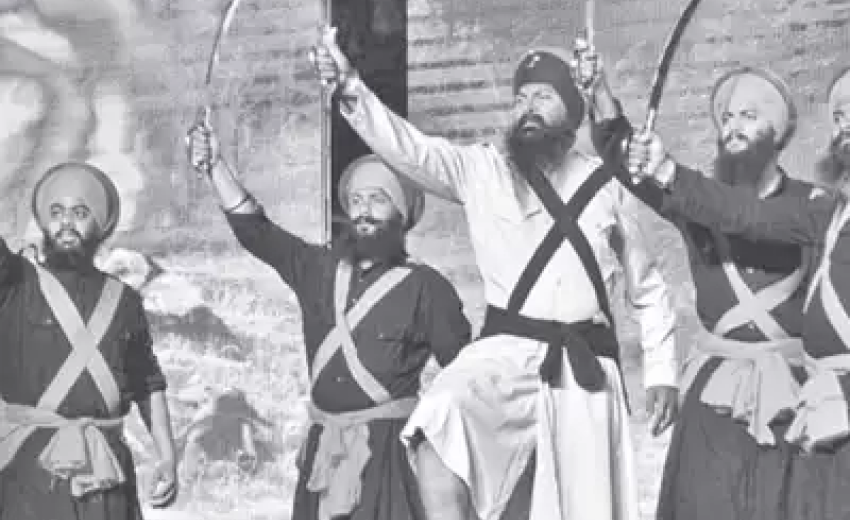Sikh history's remarkable bravery and sacrifices under Mughal rule shone brightly at Punjab Kala Bhawan. In a captivating two-and-a-half-hour play called 'Singh Soorme', produced and directed by Jarnail Singh Gogi with Panj Pani Rang Manch, the audience witnessed the heroic tales. This powerful performance, composed by Sharanjit Singh and Satpal Singh Joshila, brought alive the valorous spirit of Sikh warriors.
Gogi organized the play to teach young people about Sikh history. He wanted to show that while times change, the problems in society remain similar. Even today, we need to tackle these issues more strongly because they haven't really changed—they've just taken on new forms.
Facing Persecution with Resilience:
The play vividly portrays the brutal persecution faced by Sikhs under Mughal rulers like Zakaria Khan and Mir Mannu. The audience witnesses the cruel game of rewards for information, killing, and even bringing severed heads – a stark reminder of the atrocities endured by the community. However, amidst the darkness, the play also highlights the unwavering resilience of the Sikhs, demonstrating their ability to thrive despite relentless oppression.
A tale of Courage and Justice:
Zakaria Khan and Mir Mannu urged everyone to expel Sikhs from the province. They even offered rewards for those who gave information, killed, or brought a Sikh's severed head. They promised ten rupees for information, fifty for killing, and eighty for bringing a Sikh's severed head. Sikhs were relentlessly hunted and killed.Despite the Mughals spending a lot on this persecution, the Sikh community continued to grow and thrive.
The story starts with Zakoria Khan, the ruler of Lahore, receiving a demand from Nadir Shah, asking for money and gifts to show submission. Unsure of what to do, Khan consults Gulu Bai, a dancer in his court. Following her advice, Khan sends a message to the Sikhs, telling them to plunder Nadir Shah while assuring them that his army won’t intervene.
Later, as Nadir Shah travels back to Iran from Delhi, he stops in Punjab and is ambushed by the Sikhs in the middle of the night. They seize his riches and free the captive girls. Unaware of Khan's involvement, Nadir commands him to kill all Sikhs and fill the Golden Temple’s sarowar in Amritsar.
After Nadir Shah passed away while traveling, his companion Ahmed Shah felt it was his responsibility to eradicate Sikhs. To achieve this, he sought someone to lead Amritsar, aiming to assist in his mission. Following Gulu Bai's advice, Ahmed Shah chose Massa Ranggar for the role.
Around the same time, Jeeto, the sister of sewadar Joga, faced a tragic fate of being assaulted and murdered. Seeking vengeance, Joga went to Darbar Sahib but was attacked by Ranggar's soldiers. In retaliation, Joga brought his sister's body home, set his house on fire, and embarked on a quest for justice. He found allies in Sukha Singh and Mehtab Singh, whom he informed about the insult at Darbar Sahib. Together, they targeted Patti, eliminating its leader and seizing the revenue he carried.
This series of events sparked a chain reaction leading to a retaliation against injustices and the emergence of a group united in their cause.
The final act sees Sukha Singh and Mehtab Singh encounter soldiers blocking their way into Darbar Sahib. To get through, they pretended to be 'Choudharys' from Patti arriving to pay taxes. Inside the shrine, they witnessed a performance, but they swiftly beheaded Massa, putting an end to a courageous tale.
Powerful Performances and Enduring Message:
The outstanding performances by Simran Singh as Sukha Singh, Sunny Gill as Mehtab Singh, Nagender Gakhad as Zakoria Khan, and Sunny Sandhu as Massa Ranggar bring the characters to life with depth and emotion. Director Jarnail Singh Gogi ensures that the play balances historical accuracy with engaging storytelling, making "Singh Soorme'' a valuable learning experience for the young audience.
*Based on an article published in Times of India on 4th August 2010
